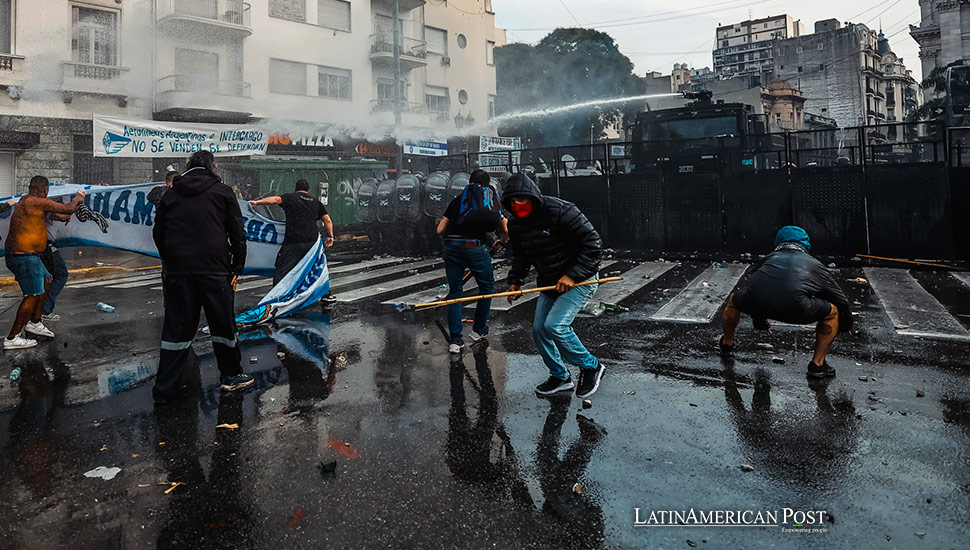Argentina Debates Milei’s Economic Reforms Amid Violent Protests

As Argentina’s Senate debates President Javier Milei’s sweeping economic reform bill, violent protests erupt in Buenos Aires. The proposed measures, aiming to privatize state entities and stimulate investment, face fierce opposition from unions and leftist political factions.
A Contentious Senate Debate
Argentina’s Senate commenced a heated debate over a significant economic reform bill championed by libertarian President Javier Milei. The proposed legislation, integral to Milei’s vision for economic revival, aims to privatize state-owned entities and incentivize business investments. This bill, already modified multiple times, passed the Lower House of Deputies in April after being rejected in February.
The Senate, split almost evenly on the bill, is gearing up for a marathon debate. Milei’s administration, which holds a minority in both legislative chambers, has been negotiating intensively to secure enough support for the bill’s approval. Outright rejection would severely hinder Milei’s reform agenda, making this vote crucial for his presidency. With the Senate comprising 72 legislators, the bill needs 37 votes to pass. Currently, it is anticipated to be a 36-36 tie, with the vice president potentially casting the deciding vote.
Protests and Public Backlash
While the Senate debates, the streets of Buenos Aires have erupted in chaos. Protesters set fires and clashed violently with police outside Congress. Demonstrators, including labor unions and leftist political groups, vehemently oppose the proposed reforms, arguing that they will exacerbate economic hardships for millions of Argentines.
Reuters footage captured the intense scenes: protesters throwing rocks and petrol bombs, cars set ablaze, and police deploying tear gas, water hoses, and rubber bullets to disperse the crowds. The violence left several people injured, and local media described the situation as resembling a battlefield. Social leader Luis D’Elia, participating in the protests, condemned the reforms, stating, “Argentine people’s lives are at play. We’ve drunk this poison several times: to have zero inflation with zero economic activity. This poison has failed several times in Argentina, and we won’t allow this to carry on.”
The opposition to Milei’s reforms is rooted in Argentina’s tumultuous economic history. Similar austerity measures in the past have led to widespread social unrest and financial instability. The main left-leaning Peronist opposition bloc, closely aligned with labor unions, is poised to vote against the bill and a separate fiscal package. The primary bill includes plans for privatizing public firms, granting extraordinary powers to the president, and spurring investment, which critics argue will undermine labor rights and social protection.
Fabio Nunez, a 55-year-old lawyer participating in the protests, expressed disbelief at the government’s direction: “We cannot believe that in Argentina we are discussing a law that will put us back 100 years.” The opposition’s resistance is driven by a belief that the reforms will disproportionately impact the most vulnerable sectors of society, exacerbating inequality and social tension.
Milei’s Vision and Symbolism
Javier Milei, known for his radical economic views and flamboyant campaign tactics, including brandishing a chainsaw to symbolize his intent to slash public spending and curb hyperinflation, sees these reforms as essential to reviving Argentina’s struggling economy. His administration has declared a state of economic emergency, proposing cuts to pensions and labor rights as part of a broader strategy to stimulate growth and attract investment.
However, the fierce opposition and violent protests underscore the deep divisions within Argentine society regarding the path forward. The outcome remains uncertain as the Senate debate continues, but the stakes are undeniably high. Approval of the bill would be a significant victory for Milei, enabling him to push forward with his broader economic agenda. Conversely, a rejection would represent a substantial setback, potentially leading to further political and social unrest.
A Nation at a Crossroads
Argentina stands at a critical juncture as it grapples with profound economic challenges and political divisions. President Javier Milei’s ambitious reform package has sparked intense debate and widespread protests, reflecting the broader struggle over the country’s future direction. As the Senate deliberates and the streets of Buenos Aires remain volatile, the nation’s path forward hangs in the balance.
Also read: Argentina’s Milei Pursues Global Alliances Using Unofficial International Tours
The outcome of this legislative battle will have far-reaching implications, not only for Argentina’s economic policies but also for its social fabric and political stability. Whether Milei’s vision of radical economic reform will prevail or the opposition’s resistance will thwart these efforts remains to be seen. Still, the urgency and intensity of the current moment are palpable.





